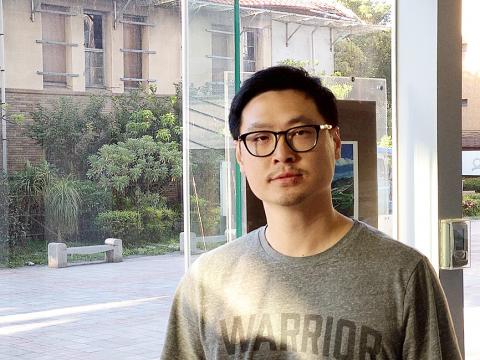HTC Corp (宏達電) yesterday said that it would release the world’s first blockchain-powered smartphone to early adopters by September, followed by a wider release toward the end of this year.
The Exodus smartphone will be equipped with a cold storage wallet to keep cryptocurrencies offline and safe from cyberattacks, and support decentralized apps, the company said.
The company has also announced partnerships with blockchain developers to build new ecosystems based on distributed ledger technology.

Photo: Wang Yi-hung, Taipei Times
Given the ubiquitousness of smartphones, the device is ideal for growing the base of dedicated nodes on blockchain networks, HTC chief decentralized officer Phil Chen (陳信生) said.
Apart from supporting cryptocurrencies, the company announced that it would introduce blockchain game CryptoKitties as an exclusive feature for its U12+ smartphone through a partnership with Animoca Brands Corp, a mobile game distributor and publisher.
The game, which involved collecting and trading virtual cats, is an example of non-fungible tokens, an aspect of blockchain technology that provides the basis for creating unique digital assets for collectible games where players compete for rare and scarce items.
Although the U12+ is not a blockchain-specific smartphone, the company would make CryptoKitties available to users of its flagship device via a downloadable app, which would not be available in other major Android app stores, the company said.
CryptoKitties is currently only available on desktop operating systems, and HTC’s downloadable app would be the world’s first mobile version of the collectible game, a company spokesperson said.
HTC hopes to see more consumers take part in blockchain ecosystems, as the high barriers of entry into blockchain mining and the extreme volatility of cryptocurrencies have left many on the sidelines, Chen said.
Chen also outlined HTC’s plans to help build an ecosystem for cryptocurrencies and decentralized applications with an emphasis on ensuring privacy and security for users.
To help users retake control of their personal data and their digital footprint, HTC has partnered with Bitmark Inc, a Taipei-based blockchain start-up that develops tools to preserve records of digital ownership and the transaction history of digital assets through cryptography hashing.
While HTC has given little further details on blockchain applications on the Exodus, the company has taken a first step toward safeguarding privacy and preventing the commodification of personal data, it said.
As the company continues to grapple with a tougher smartphone market, it has shifted its focus to developing leading-edge technologies for artificial intelligence, 5G networking, blockchain, augmented reality and virtual reality as part of its turnaround plan.

KEEPING UP: The acquisition of a cleanroom in Taiwan would enable Micron to increase production in a market where demand continues to outpace supply, a Micron official said Micron Technology Inc has signed a letter of intent to buy a fabrication site in Taiwan from Powerchip Semiconductor Manufacturing Corp (力積電) for US$1.8 billion to expand its production of memory chips. Micron would take control of the P5 site in Miaoli County’s Tongluo Township (銅鑼) and plans to ramp up DRAM production in phases after the transaction closes in the second quarter, the company said in a statement on Saturday. The acquisition includes an existing 12 inch fab cleanroom of 27,871m2 and would further position Micron to address growing global demand for memory solutions, the company said. Micron expects the transaction to

Vincent Wei led fellow Singaporean farmers around an empty Malaysian plot, laying out plans for a greenhouse and rows of leafy vegetables. What he pitched was not just space for crops, but a lifeline for growers struggling to make ends meet in a city-state with high prices and little vacant land. The future agriculture hub is part of a joint special economic zone launched last year by the two neighbors, expected to cost US$123 million and produce 10,000 tonnes of fresh produce annually. It is attracting Singaporean farmers with promises of cheaper land, labor and energy just over the border.

US actor Matthew McConaughey has filed recordings of his image and voice with US patent authorities to protect them from unauthorized usage by artificial intelligence (AI) platforms, a representative said earlier this week. Several video clips and audio recordings were registered by the commercial arm of the Just Keep Livin’ Foundation, a non-profit created by the Oscar-winning actor and his wife, Camila, according to the US Patent and Trademark Office database. Many artists are increasingly concerned about the uncontrolled use of their image via generative AI since the rollout of ChatGPT and other AI-powered tools. Several US states have adopted

A proposed billionaires’ tax in California has ignited a political uproar in Silicon Valley, with tech titans threatening to leave the state while California Governor Gavin Newsom of the Democratic Party maneuvers to defeat a levy that he fears would lead to an exodus of wealth. A technology mecca, California has more billionaires than any other US state — a few hundred, by some estimates. About half its personal income tax revenue, a financial backbone in the nearly US$350 billion budget, comes from the top 1 percent of earners. A large healthcare union is attempting to place a proposal before